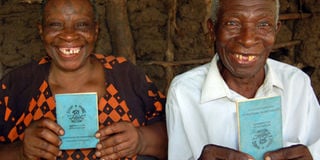Mozambicans or Kenyans? Years later, Makonde still seek identity

One of the Makonde community elders, Mr Masera Punda and his wife Margret, display documents they got from the Mozambique Embassy. He was speaking to the Nation at his home Ukunda, Kwale County. He is among the Makonde who came from Mozambique in 1955 and has been living in Kenya up to date. Photo/GEORGE KIKAMI.
What you need to know:
- Consul says they are unable to acquire papers because they are proud to be Mozambicans
- The first generation of the 40,000-strong community came to Kenya in the ‘40s and ‘50s
Mr Masera Hatikinika and his three brothers left Mozambique for Kenya in 1955 in search of greener pastures.
The 76-year-old Mozambican from the Makonde ethnic community says poverty, lack of education and jobs made them make the long journey from the southeast African country.
“Due to illiteracy and lack of jobs we had no future in Mozambique. We were living in grinding poverty,” he recalls.
Upon his arrival at Vipingo in the now Kilifi County, together with his siblings, they landed casual jobs at Vipingo Sisal Estate.
The following year, he quit the sisal estate for Bamburi Cement where he earned Sh80 per month and a Sh15 bonus.
“My Sh95 salary per month was a lot of money those days. So our lives got better and I was able to send money back home to my parents,” he added.
The elderly man is married and has five children and grandchildren. His brothers died years ago leaving behind a number of children.
Mr Hatikinika recalls that hundreds of Makonde left their country for Kenya in the 1950s to work in the sisal farms in Kilifi and Taita Taveta counties as well as at the defunct Ramisi sugar factory in Kwale County.
After working at the Coast for many years, he says, many of them intermarried with Kenyans and decided to settle here.
Sadly, he notes, the Makonde whose number he estimated at 40,000 have been unable to acquire Kenyan identity cards.
In Kwale, there are about 9,000 Makondes living in Ukunda, Makongeni, Vanga, Lunga Lunga, Mangwei, Ramisi, Gazi, Shimba Hills, Kanana, Mwanga and Tiwi.
Others have settled at Mtwapa, Mtondia, Vipingo and Watamu in Kilifi as well as in Kisauni in Mombasa County and Mwatate in Taita Taveta.
“Without Kenyan IDs and birth certificates, they are unable to get jobs, pursue higher education, acquire land or even save money in the banks,” he lamented.
“Lack of IDs has left the Makonde community in abject poverty although they are renown woodcarvers.”
In an interview with the Nation at his home in Ramisi, Mr Hatikinika appealed to the government to allow the Makonde who have been living or born in the country to acquire citizenship.
Makonde community chairman Thomas Nguli, says he was born at Lunga Lunga in Kwale, adding that his parents, who passed away years ago, arrived in Kenya in 1949.
He is married and has five daughters, three of whom are married to Kenyans. “I was born at Lunga Lunga 55 years ago and since then, I have never been to Mozambique,” he said.
“Kenya is my home country and therefore, my family and my 10 grandchildren deserve to acquire Kenyan citizenship.”
The community secretary, Mr John Khamis, 43, who was born at Kanana in Kwale, said although majority of them were born here, the Mozambican government wants them to participate in the elections slated for October.
However, when reached for comment, Mozambican consul in Mombasa Floriano Wadyeko said the Makondes living at the Coast had been unable to acquire Kenyan citizenship since they are proud of their Mozambican identity.
He did not disclose the population of the Makonde, but disputed the 40,000 figure, noting that in 2009, Mozambique opened a consulate in Mombasa following a request from the community.
Mr Wadyeko said the Mozambican government has over the years been issuing identity certificates to the Makonde born in Kenya for them to live here legally.
The certificates, he added, can be used for travel, banking transactions, education among other issues.
“The Makonde who were born in Kenya want to be identified as Mozambicans and that is the reason why they cannot be issued with Kenyan IDs,” he said.
“They even participated in the Mozambican general elections of 2004 and 2009. We expect them to vote in the October poll,” Mr Wadyeko explained.
However, he said, Makondes wishing to become Kenyan citizens were free to do so provided that they follow the laid down procedures.
Mr Wadyeko argued that some briefcase Non-Governmental Organisations were misleading the Makonde to take Kenyan citizenship in efforts to attract donor funding and called for their investigation.
Kwale county commissioner Evans Achoki said the Makonde deserve Kenyan citizenship since they have been living in the country for many years.
This was echoed by Officer in charge of Immigration Services Coast Region Joseph Kanyiri, who said their application for citizenship and would be considered on merit.




